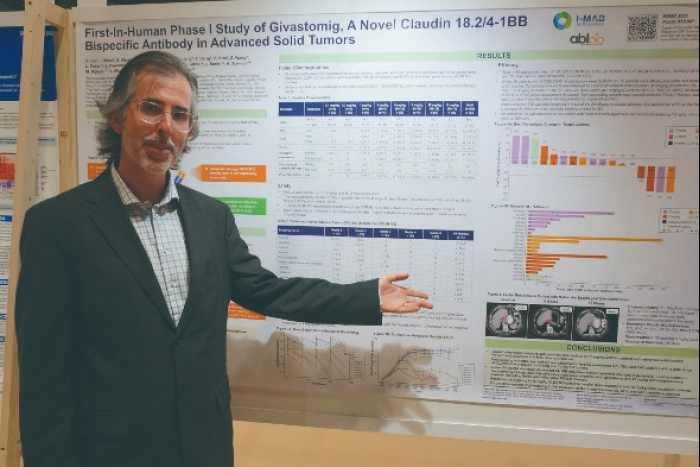Bio & Pharma
'World-class bispecific antibody technology of ABL Bio'
Joint development of gastric and esophageal cancer treatments is selected as the best research poster
By Nov 13, 2023 (Gmt+09:00)
2
Min read
Most Read
LG Chem to sell water filter business to Glenwood PE for $692 million


KT&G eyes overseas M&A after rejecting activist fund's offer


Kyobo Life poised to buy Japan’s SBI Group-owned savings bank


StockX in merger talks with Naver’s online reseller Kream


Meritz backs half of ex-manager’s $210 mn hedge fund



MADRID - "The clinical Phase 1 results of the immune-oncology candidate ABL111, developed in collaboration with ABL Bio, have been selected as the best poster in the investigational immunotherapy field at the European Society for Medical Oncology (ESMO)," said John Hayslip, Chief Medical Officer (CMO) of I-MAB Biopharma.
He met with the Korea Economic Daily exclusively at the ESMO event recently held in Madrid, Spain.
"Even patients who have received previous standard treatments are able to achieve objective responses even Givastomig just as single drug."
I-MAB, headquartered in China, is a Nasdaq-listed company focusing on the development of cancer immunotherapy drugs. I-MAB has been in a cooperative relationship with ABL Bio since 2018 and is jointly developing two immuno-anticancer drug candidates.
One of them is ABL111, the clinical results of which were recently revealed. CMO Hayslip is an expert who has focused on academic research and new drug development across cancer-related academia and industry for 25 years. He joined I-MAB last year after serving as an AbbVie researcher and vice president of clinical development at Nektar Therapeutics.
ABL111 is classified as an innovative new drug with no competing drugs with similar principles. It was developed using Grabody-T technology, ABL Bio’s Bispecific antibody platform.
Last year, ABL Bio transferred the candidate material developed with Grabody-B, another platform technology, to the multinational pharmaceutical company Sanofi for up to KRW 1.43 trillion.
Grabody-T targets the signaling system (4-1BB) that recruits immune cells and orders them to attack. It was developed to precisely transmit these signals to cancer cells. ABL111 attaches to a specific protein (claudin 18.2) commonly found in gastric cancer and gives an attack command. This principle helps immune cells attack cancer cells.
“However, the early and direct 4-1bb agonist causes wide spread throughout the body immune activation and often cause liver injury, liver toxicity. It has higher efficacy and also better safety,“ CMO Hayslip said.
In the clinical trial, the cancer cells of 4 out of 17 patients with terminal stomach and esophageal cancer who received ABL111 were noticeably reduced, recording a response rate (ORR) of 24%. There were five patients who received the optimal dose, and cancer cells decreased in two of them. ORR is 40%. No serious side effects (grade 4 to 5) were reported.
“I’m pleased that this drug I’m developing with ABL Bio is leading to object responses with heavily pretreated patients. And so perhaps I just looking at the experience we can see that there is reasons to be hopeful for this this drug that we're developing together may be all by,” CMO Hayslip said.
"We expect early 2024 to begin enrolling patients in combination with chemotherapy and checkpoint inhibitor and Givastomig," he added.
Write to Woosang Lee at idol@hankyung.com
More to Read
-
 Bio & PharmaABL Bio gets OK for phase 1 clinical trials for immune-oncology drug
Bio & PharmaABL Bio gets OK for phase 1 clinical trials for immune-oncology drugAug 10, 2023 (Gmt+09:00)
1 Min read -
 PharmaceuticalsABL Bio in $1.06 bn deal with Sanofi for Parkinson's disease treatment
PharmaceuticalsABL Bio in $1.06 bn deal with Sanofi for Parkinson's disease treatmentJan 12, 2022 (Gmt+09:00)
2 Min read
Comment 0
LOG IN


